Home › Forums › A SECURITY AND NEWS FORUM › The rise of Africa hinges on agricultural productivity
- This topic is empty.
Viewing 1 post (of 1 total)
-
AuthorPosts
-
2022-12-06 at 17:05 #385087
 Nat QuinnKeymaster
Nat QuinnKeymasterThe climb out of poverty for the rich world began with rising agricultural productivity, which freed up labour for other tasks. Modern agri-technology must do the same for Africa.
Western environmental lobby groups are determined to keep Africa poor. They tout the virtues of ‘subsistence farming’, which is how two thirds of the ancestors of Western elites scraped by during the Middle Ages.
They attack large-scale commercial farming because it smells like capitalism. They demonise agricultural technology, from fertilisers to genetically enhanced crop varieties, because it conflicts with their nostalgia for a simple, pure, idyllic state of nature.
Disillusioned with their own complex, sophisticated, industrialised but wealthy society, they seek to preserve the natural innocence, freedom and equality of humanity in a ‘natural’ state of poverty.
The best place to do so is Africa, the last continent where the eco-socialist, agrarian ideals of the environmental elites survive largely unmarred by the supposedly corrupting influences of capitalism and modern technology.
Romantic primitivism
They idealise the rural idyll of villages filled with people who toil in the fields, self-sufficient, producing no wasteful excesses, polluting no water or soils, and emitting no odious gases other than those that hard-working humans naturally produce.
Look how happy African subsistence farmers are!

The romantic primitivism that has for centuries pervaded the thought of Western elites is, of course, deeply racist, and extremely prejudicial to Africa, its people, and its development.
To grow out of poverty, agricultural productivity in Africa needs to rise by multiples. Productivity per farm worker is deplorable in Africa, compared to rich countries:
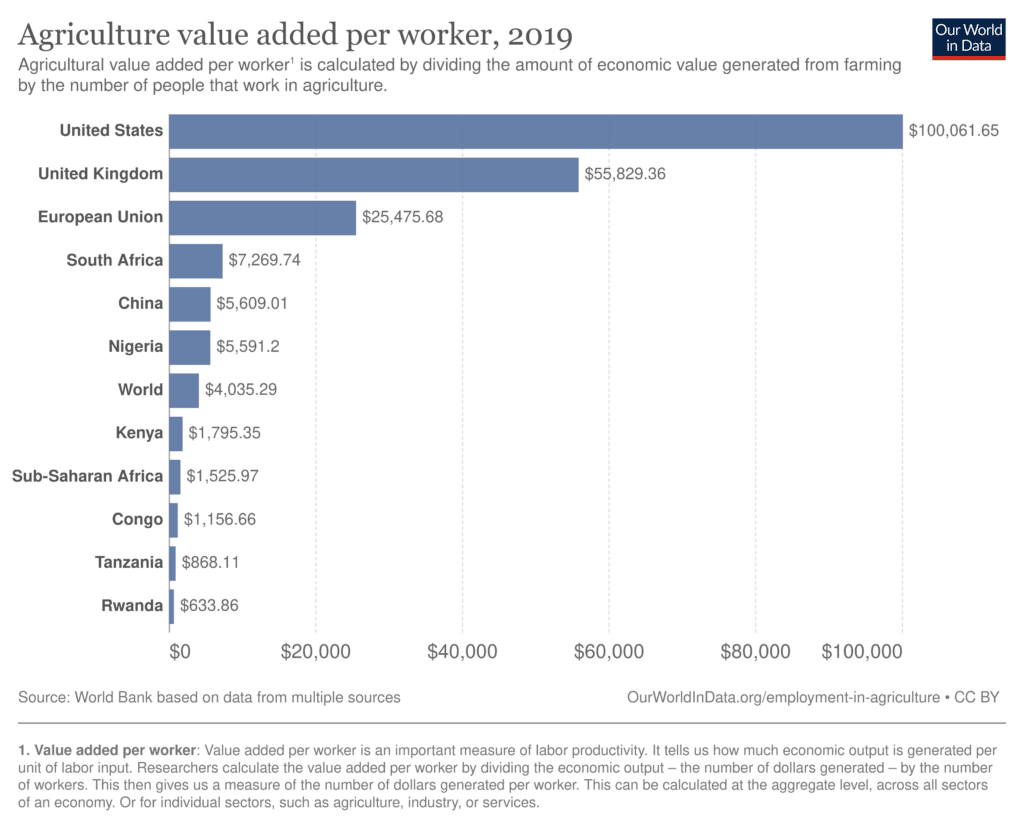
When people produce only as much as they need to feed themselves and their families, they do not earn enough to invest in education, healthcare, infrastructure, and the industrial advancements that undergird rising prosperity.
Agriculture and income
When a majority of people are engaged in agriculture, they are not available to contribute to other economic activities. Prosperous countries employ only a small percentage of their labour force in agriculture. In fact, there is a strong negative correlation between the share of the population a country employs in agriculture and its income level:
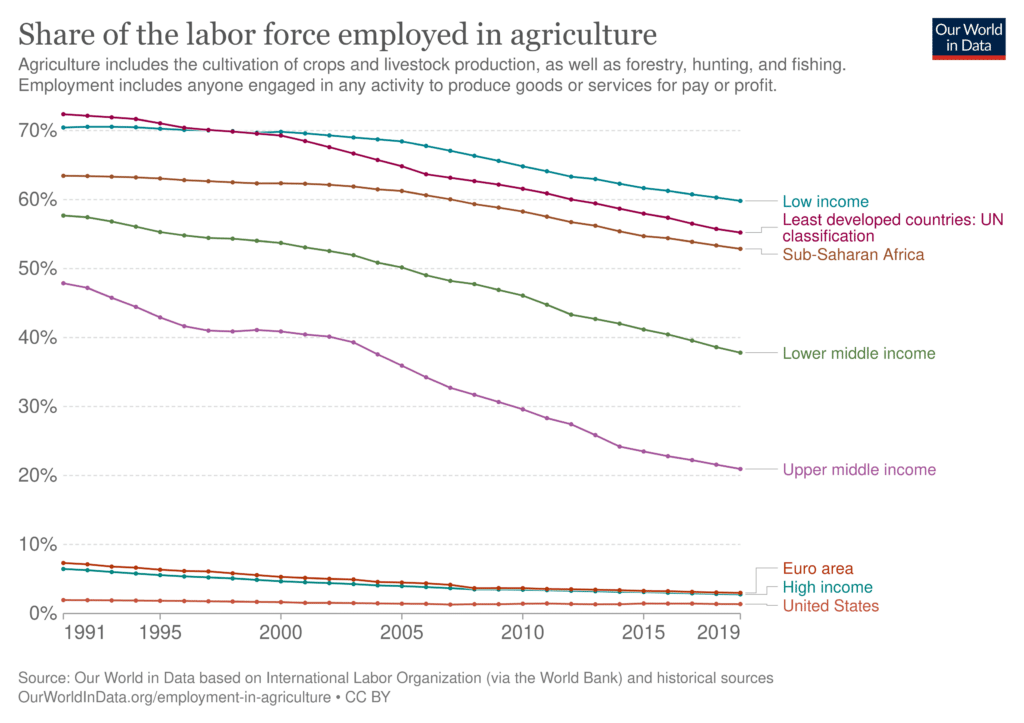
European countries for which records go back hundreds of years show that they all started where sub-Saharan Africa is now, but dramatically reduced the share of their populations devoted to producing food, which freed them up to invest time, effort, and capital in the industrial revolution that generated their present high level of prosperity.
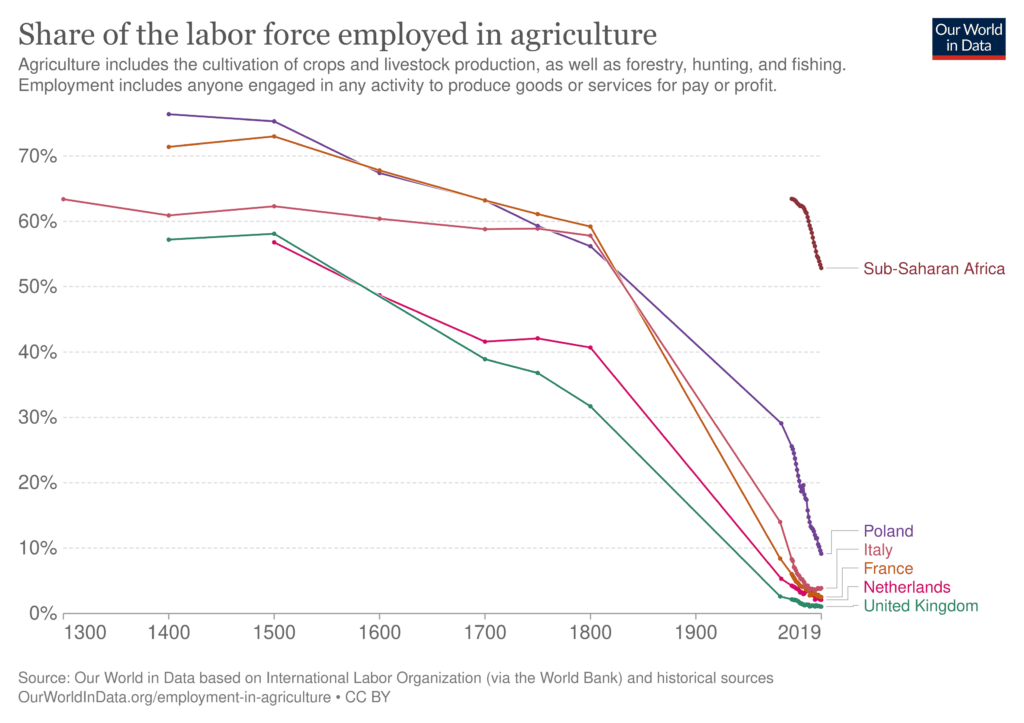
African farmers, too, need to produce much more food per hour worked, to reduce the share of the population that needs to work to keep that population fed.
And to reduce deforestation and preserve wildlife habitats, they need to produce much more food per hectare. In southern Asia, all of the increase in cereal production since 1980 was achieved by improving yields. In Africa, almost all of the increase came from expanding the use of land.
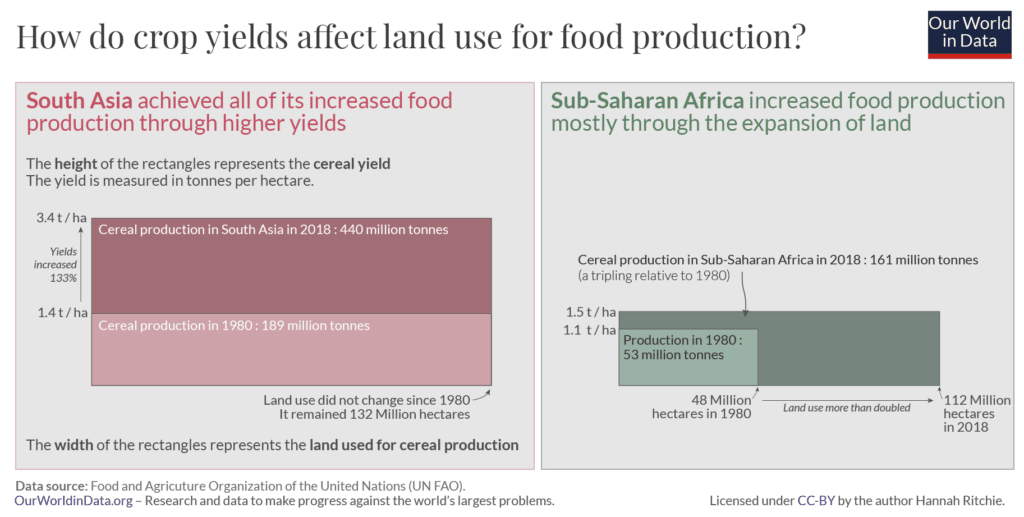
Anti-GM lies
Environmentalists will tell you that organic farming can achieve that. It cannot.
To dramatically increase African farmer productivity requires modern machinery, better irrigation, a substantial increase in the use of fertiliser, and new yield-improving technologies such as genetic enhancement of crops.
The movement by Western environmentalists against genetically modified (GM) crops is particularly toxic. It is based on a large number of false assertions, all of which achieve nothing but keeping Africa down.
Joseph Maina, a Kenyan journalist and senior lecturer in the Department of Earth and Environmental Sciences at Macquarie University in Sydney, compiled a detailed overview of the false claims made by African anti-GM campaigners, who are deeply influenced by wealthy Western environmental NGOs.
He concluded that, contrary to the anti-GM propaganda, GM foods are safe for human consumption; GM crops do not require increased pesticide use; African countries are capable of regulating them; GM crops do increase harvest volumes and farm incomes; buying GM seed is not prejudicial to farmers, who voluntarily choose to adopt them; GM crops can improve food security and population nutrition; they are not a ‘failed technology’, ‘dumped’ in Africa; GM varieties do produce higher yields and conventional crops; GM crops to not pose risks to Africa’s biodiversity, and can, in fact, lead to greater biodiversity sustainability; and GM crops do not pose a threat of unwanted gene flow to wild plant species.
Maina has also surveyed the views of African leaders, many of whom rightly support the use of GM crops in agriculture.
Feeding billions
Africa must dramatically increase its food production, not only to stamp out malnutrition among its present population, but to cater for a future population that is projected to grow rapidly, from today’s 1.4 billion to 2.5 billion by 2050 and more than 4 billion in 2100.
It is possible. It has been done before. Only a few hundred years ago, the rich world, too, employed a majority of its people in agriculture, and a majority of its people were dirt poor as a consequence.
We know that productivity improvements are possible, thanks to the Green Revolution of the 20th century, led by Nobel Peace Prize winner Norman Borlaug, which saved an estimated one billion people from starvation.
We know how to achieve those productivity improvements. The technology exists. It has been implemented elsewhere. It is why the rich world produces five times as much cereal per hectare than Africa does:
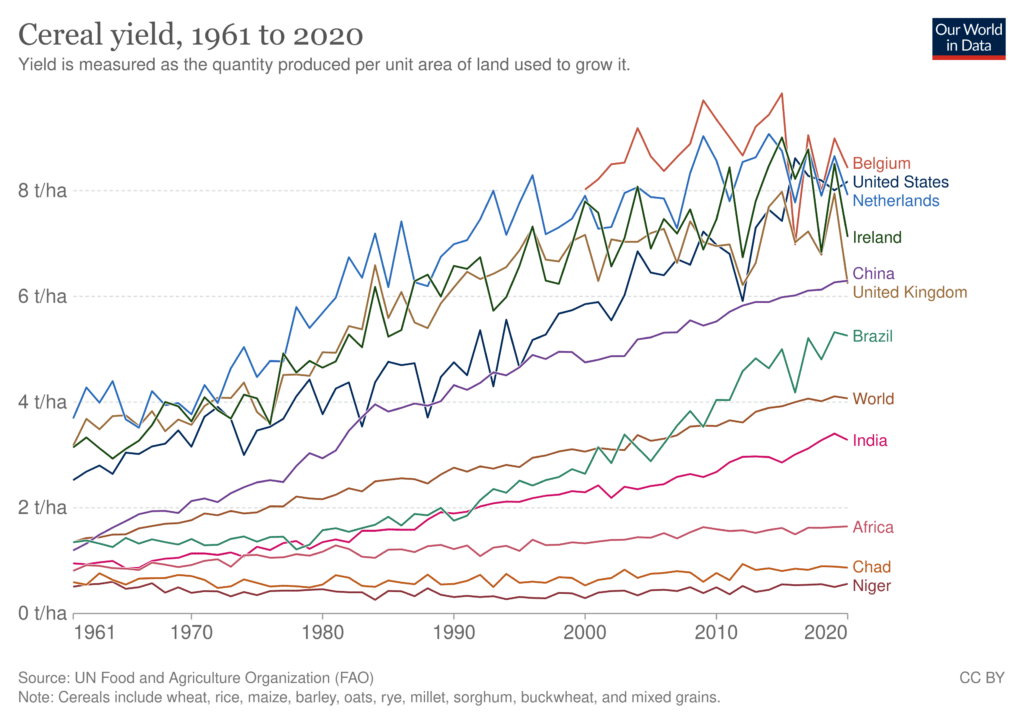
All Africa needs is a determination to apply this knowledge, use these technologies, and vigorously resist the environmental lobby groups that seek to deny Africa the same ability to feed itself and emerge from agrarian poverty that the rich world used.
To feed Africa doesn’t require charity or condescending organic subsistence farming projects led by Western NGOs. It takes exactly the same productivity improvements that were used to such dramatic effect elsewhere.
The rise of Africa hinges on agricultural productivity – Daily Friend
-
AuthorPosts
Viewing 1 post (of 1 total)
- You must be logged in to reply to this topic.
